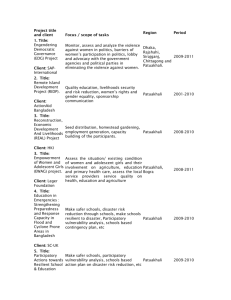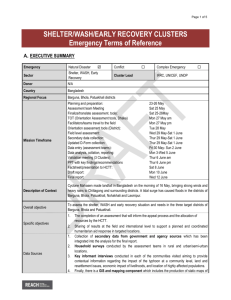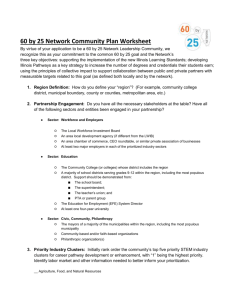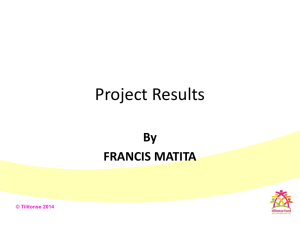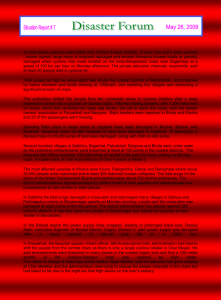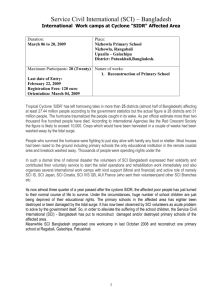Sixteen(16)
advertisement
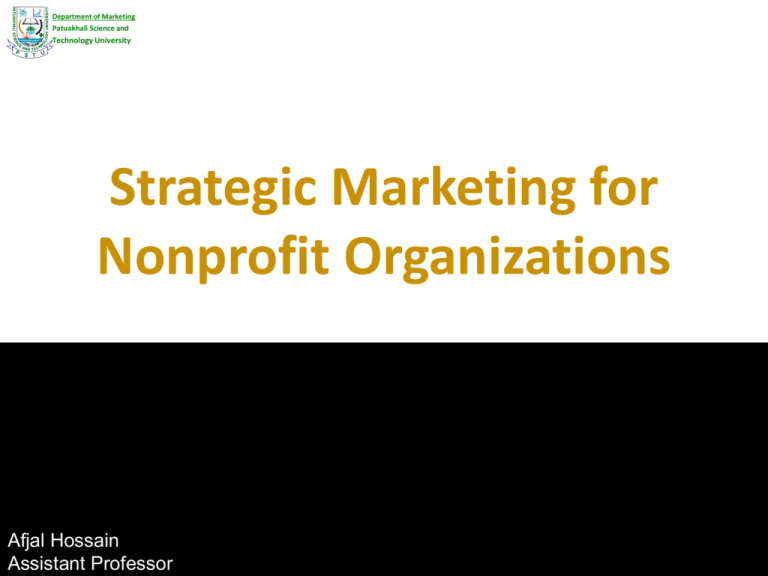
Department of Marketing Patuakhali Science and Technology University Strategic Marketing for Nonprofit Organizations Afjal Hossain Assistant Professor Department of Marketing Patuakhali Science and Technology University Chapter Sixteen Facilitating Marketing Behaviors Department of Marketing Patuakhali Science and Technology University Facilitation Planning Definition 2 Principal Dimensions 1st Channel Strategy 1st Occasion Strategy Department of Marketing Patuakhali Science and Technology University Channel Strategy Definition Components of a Channel Strategy: 1. Direct versus indirect marketing 2. Length and breadth of the channel structure 3. Allocation of functions 4. Recruiting channel members 5. Co-ordination and control Department of Marketing Patuakhali Science and Technology University Criteria for Channel Strategy 1. Efficiency 2. Effectiveness Department of Marketing Patuakhali Science and Technology University Channel Strategy: Advantages of direct channel 1. 2. 3. 4. 5. 6. 7. 8. Any organizational benefits do not have to be shared with other organizations or individuals All channel activities are controlled by the marketer Direct contract with target audience members provide the marketer with a better understanding of their needs and wants Direct contract with target audience members means quicker awareness of any problems with programs and products Respond to changes in the market place Opportunities for experimentation with alternative ways of reaching target audience members are available More attention can be given to the marketer’s offerings that would be possible if it were only one of many carried by an intermediary Strategies aimed at various target audience segments can be precisely tailored Department of Marketing Patuakhali Science and Technology University Channel Strategy: Advantages of indirect channel 1. Many organizations lack the financial resources to carry out a full program of direct marketing themselves 2. Even if an organization has the funds to build its own channel to the target audiences, it might not be able to do so as cheaply as through using an existing system Department of Marketing Patuakhali Science and Technology University Channel Strategy: Length versus Breadth Distribution can be: 1. Exclusive distribution 2. Selective distribution 3. Mass distribution In Mass distribution products/ services can be: 1. Convenience goods and services 2. Shopping goods and services 3. Specialty goods and services Department of Marketing Patuakhali Science and Technology University Channel Strategy: Achieving Co-ordination and Control Co-ordination and Control are difficult: 1. Competition among nonprofits for limited funds 2. Nonprofit leaders or staff may perceive co-operation 3. Territoriality can be a problem if one agency is unwilling to be subservient to another in an area in which the first agency believes it should be in charge 4. Differences in goals and values can often raise problems 5. Excessive time and energy cost may occur 6. Personality classes are not unusual Department of Marketing Patuakhali Science and Technology University Development of an effective intermediary marketing strategy 1. Identify all potential intermediary segments 2. Evaluate potential segments and select the best subset for detailed investigation 3. Identify the basic BCOS factors that are likely to influence these target intermediaries 4. Develop strategies to increase the perceived benefits and reduce the perceived costs of production 5. Evaluate the probable costs and payoffs of each strategy 6. Determine optimal strategies for maintaining the desired relationships Department of Marketing Patuakhali Science and Technology University Development of an effective intermediary marketing strategy: The Principles 1. 2. 3. 4. 5. 6. 7. The best marketing strategy begins with the target audience member It is the target audience member’s needs, wants and perceptions Since these needs, wants and perceptions are subjective phenomena, the marketer cannot know them and so must resort to formal or informal research to ascertain them The number of exchanges increases if and only if the cost/ benefit ratios perceived by selected target audience are changed in a favorable direction Since change in cost/ benefit ratios is crucial, alternative marketing strategy choices Strategy must be developed not only to create first time trials but also to ensure continued usage by trial participants Finally the selection of optimum short and long-run strategies is not only merely a matter of increasing effectiveness in creating exchanges, the selection must also take into account the costs to the organization of creating exchanges Department of Marketing Patuakhali Science and Technology University Developing intermediary co-ordination strategies 1. Requiring intermediary co-operation 2. Rewarding 3. Persuading intermediaries to co-operate through the use of experts and information Department of Marketing Patuakhali Science and Technology University Occasion strategies 1. Easy to accomplish in a physical sense 2. An emotionally positive experience 3. Rewarding a reinforcing Department of Marketing Patuakhali Science and Technology University Factors affecting Behavior Easy 1. 2. 3. 4. Convenience in time Convenience in location Minimal distractions Complete availability of any tools, equipment or advice that might be needed Department of Marketing Patuakhali Science and Technology University Making the Behavior Occasion an Emotional “High” 1. 10K races or walk-a-thons can be made exciting occasions to donate 2. Walking up stairs at work can be made fun by providing videos or office-related cartoons on the landings 3. Exercise classes can be enlivened by upbeat music 4. Scary or painful health procedures like blood donation can be made positive experiences by warm, enthusiastic staff members Department of Marketing Patuakhali Science and Technology University Designing a Service Facility Decision 1. What should the building look like on the outside? 2. What should be the functional and flow characteristics of the building? 3. What should the museum feel like on the inside? 4. What materials would best support the desired feeling of the building? Department of Marketing Patuakhali Science and Technology University Making the behavior occasion rewarding and reinforcing 1. 2. 3. Individuals rate their experiences by comparing expectations with experiences Reinforcing in well known that people will repeat behaviors when they are rewarded Marketers often use unexpected materials rewards as reinforces Thank You Make Presentation much more fun
